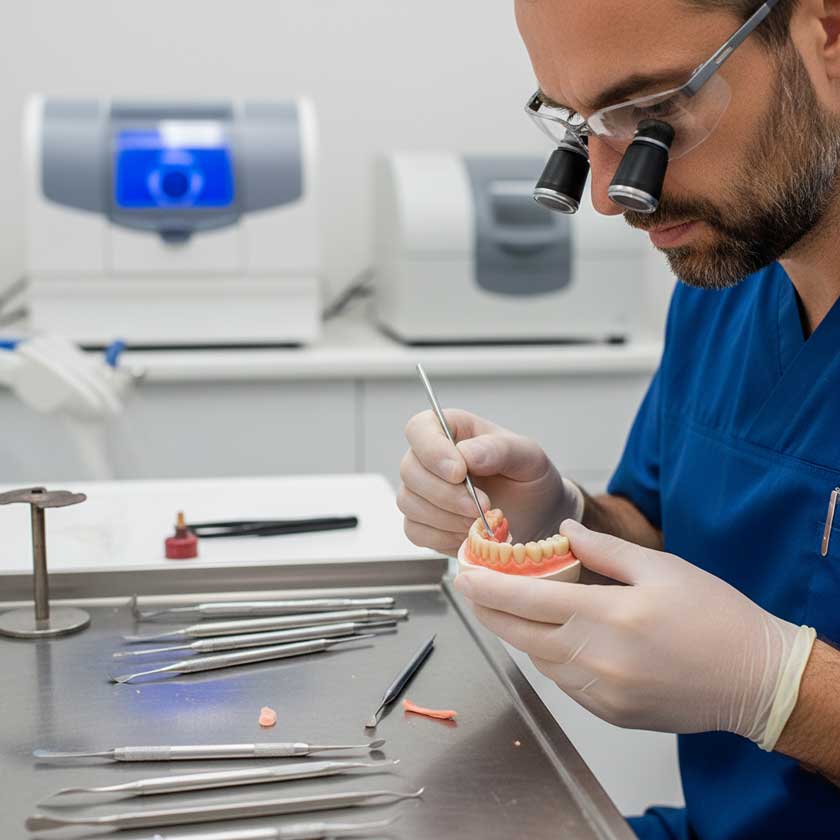Key Takeaways:
- Causes of Gum Irritation: The article highlights that one of the primary causes of gum irritation in denture wearers is ill-fitting dentures, which can rub against the gums and create sore spots or ulcers.
- Home Remedies and Immediate Relief: It suggests using denture adhesive to reduce friction and cushion the gums, along with rinsing with warm saltwater to heal gums and relieve pain temporarily.
- Dietary Adjustments for Denture Comfort: The article recommends avoiding hard or sticky foods that can exacerbate gum pain and suggests opting for softer, denture-friendly foods to reduce discomfort and prevent gum inflammation.
- Special Considerations for Denture Wearers: It emphasizes the importance of ensuring dentures fit properly, maintaining good oral hygiene even with partial dentures, and the potential use of denture stabilizers for added comfort.
- Coping Strategies for Dry Mouth and Stomatitis: The article discusses strategies to alleviate dry mouth in denture wearers, like staying hydrated and using saliva substitutes, and addresses stomatitis by recommending proper denture fit and good oral hygiene.
- Professional Assistance and Dental Care: Lastly, the article underscores the importance of seeking professional dental attention if home remedies do not alleviate pain or if persistent discomfort or sores occur, highlighting the necessity of regular dental check-ups and adjustments for dentures.
- Importance of Denture Cleaning Solution: The article emphasizes the importance of using a denture cleaning solution to maintain oral hygiene and prevent gum irritation. Soaking dentures in the cleaning solution overnight can help prevent infections and irritation, underscoring the necessity of a daily cleaning routine for both dentures and gums.

Understanding the causes of gum irritation.
Gum irritation is common for denture wearers. But don't worry; there are ways to ease the discomfort. One of the primary causes of gum irritation is ill-fitting dentures, which can lead to significant denture related pain.
When dentures don't fit properly, they can rub against your gums and cause sore spots or ulcers. It's essential to address the issue promptly to relieve these painful gum sores.
Immediate relief measures.
First, try using denture adhesive to cushion and reduce friction between your dentures and soft tissues. Using a little glue on your dentures can make them fit better, stop them from moving, relieve denture pain, and prevent them from hurting your gums.
Remember to follow the instructions provided by the manufacturer when using denture adhesive. Another home remedy that can help manage gum irritation is rinsing your mouth with warm saltwater.
Mix 1/2 tsp of salt in warm water, swish in mouth for 30 seconds, then spit it out. Saltwater can heal gums, speed up healing, and temporarily relieve gum pain.
Additionally, seeking professional dental attention is important if you still have gum sores, even with good oral care. They can check if adjustments like realigning or replacing dentures are needed to make sure they fit well and reduce discomfort.
To manage gum irritation, take care of your oral hygiene, not just physical symptoms. Gently brush your gums with a soft toothbrush after taking out your dentures to improve blood flow and reduce soreness.
Massaging your gums daily with a clean finger in circular motions can help reduce inflammation and provide relief. Gum irritation is a common issue for denture wearers, but it doesn't have to be a constant source of discomfort.
To relieve gum soreness and ensure comfortable dentures, follow these steps: Ensure that your dentures fit properly. If necessary, use adhesive to secure them in place.
Maintain good oral hygiene by brushing your teeth and gums regularly.
Seek professional assistance if you experience persistent discomfort or soreness. Remember to listen to your body's signals and take proactive steps to address any concerns that arise along the way.
Dietary adjustments.
Foods to avoid for comfort.
When it comes to relieving denture pain, making some dietary adjustments can work wonders. Certain foods can exacerbate gum pain and discomfort, especially if you have poorly fitting dentures. To reduce denture discomfort, consider incorporating soft foods into your diet and avoid certain foods that can cause issues. This can help alleviate discomfort.
Avoid hard or sticky foods that can hurt gums or make dentures come loose. This means being cautious with items like nuts, popcorn, chewy candies, and sticky caramel treats.
Denture-friendly food choices.
Choosing softer foods like cooked veggies, mashed potatoes, smoothies, and soups can reduce discomfort from loose dentures. Avoid eating very acidic or spicy foods to prevent gum inflammation and irritation.
Acidic fruits like citrus fruits (lemons, oranges), tomatoes, or pineapple could trigger discomfort in individuals with sensitive gums. Similarly, spices like chili peppers or hot sauces may lead to further gum ulcers or swollen gums.
People with dentures can ease discomfort from spicy or acidic foods by choosing mild flavors and less acidic options. These options include bananas, applesauce, yogurt, or plain cooked grains.
If your dentures don't fit well or irritate your gums, you can find relief by being mindful of your diet. Making changes to your diet that suit your needs will help you feel better. This will help you feel better.
But remember, seeing a dentist or denturist is important if the pain continues even after making these changes. They can assess your situation and suggest treatments like adjusting your dentures or using a cushion for more comfort. Remember: Taking care of your oral health goes hand in hand with ensuring your dentures fit and function properly.
Special considerations for denture wearers.
Dealing with partial dentures and natural teeth.
Tips for Denture Wearers: To ease discomfort and pain, denture wearers should keep some special considerations in mind. One common issue many denture wearers face is gum irritation caused by poorly fitting dentures.
This can lead to gum ulcers, swollen gums, and even gum sores. Ensuring that your dentures fit properly to address these concerns is important.
Importance of proper fitting.
If your dentures feel loose or your gums are sore, it might be time to get them adjusted. Going to the dentist can tell you if your dentures need fixing to make them more comfortable.
Remember, properly fitting dentures should not cause any pain or soreness. Another consideration for denture wearers is the presence of natural teeth alongside their partial dentures.
It's important to keep up with good oral hygiene by brushing and flossing regularly, even if you're missing some teeth. Not taking care of your teeth can cause gum pain, swelling, and a higher chance of getting gum diseases like gingivitis.
Using a denture stabilizer can make partial dentures more comfortable and reduce the chance of sore spots or tender gums. It also helps prevent friction between the dental implant and the gums and maintains good oral hygiene practices. Denture stabilizers, like adhesive strips or creams, help keep dentures securely attached to the gums.
If your dentures bother you or you’re worried, seeing a prosthodontist for professional help is important. They will be able to evaluate your specific situation and provide appropriate treatment options tailored specifically for you. Additionally, wearing denture adhesive can be a potential solution for discomfort caused by poorly fitting dentures, though it may not fully alleviate pain.
Adjusting to Your Dentures
Adjusting to your dentures can take time, but with a few simple tips, you can make the transition smoother. When you first start wearing dentures, it’s normal to experience some discomfort, sore gums, and difficulty speaking or eating. However, with practice and patience, you can get used to your dentures and enjoy a more confident smile.
To adjust to your dentures, start by wearing them for short periods and gradually increase the time as you become more comfortable. Practice speaking and eating with your dentures in, and don’t be afraid to ask for help or advice from your dentist or a family member. It’s also essential to maintain good oral hygiene by cleaning your dentures regularly and visiting your dentist for regular check-ups.
In addition, consider using a denture adhesive to help keep your dentures in place and alleviate sore gums. Denture adhesive can provide extra stability, reducing movement and friction that can cause gum irritation. You can also try using aloe vera gel to soothe irritated gums and promote healing. Aloe vera is known for its soothing properties and can be a natural way to relieve gum discomfort.
By following these tips, you can adjust to your dentures and enjoy a more comfortable and confident smile. Remember, patience and consistency are key to making your dentures feel like a natural part of your daily routine.
Coping with dry mouth.
Hydration and saliva stimulants.
Coping with Dry Mouth Dry mouth, or xerostomia, can be a common challenge faced by denture wearers.
The lack of saliva production can lead to discomfort and difficulty in speaking and eating. However, fear not!
You can employ several strategies to alleviate the bothersome effects of dry mouth. One effective way to cope with dry mouth is by staying hydrated.
Make it a habit to sip water frequently throughout the day to keep your mouth moist. Chewing gum or having sugar-free candies can make more spit and help with dryness for a little while.
These remedies help with discomfort and prevent gum ulcers or inflamed gums. Don't use mouthwash or tobacco products to deal with dry mouth, as they worsen the problem.
Instead, choose rinses without alcohol or try saliva substitutes made for people with dry mouth symptoms. These substitutes imitate saliva and moisturize your mouth, relieving any discomfort from dryness.
Avoiding irritants and proper denture care.
Furthermore, it is crucial to maintain proper denture hygiene when dealing with dry mouth. Clean your dentures thoroughly every day, removing any food particles that may contribute to gum pain or irritation.
Be diligent about brushing and flossing your remaining teeth if you also have a partial denture. If your dentures don't fit well and are making your mouth dry, you might need to adjust or realign them.
Loose dentures can lead to increased rubbing and irritation on the gum tissues, worsening dryness symptoms. You should book a dentist appointment. The purpose is to determine if denture stabilizer or adhesive can help keep dentures in place. Additionally, it can also help stop them from rubbing.
To deal with dry mouth, drink water, avoid things that make it worse, and keep your dentures clean. By using these strategies, you can reduce dry mouth discomfort and have a better time wearing dentures.
Addressing stomatitis (Inflammation of oral tissues)
Identifying and treating stomatitis.
Stomatitis, which refers to the inflammation of oral tissues, can be an uncomfortable and bothersome condition for denture wearers. Poor denture retention, ill-fitting dentures, or constant denture irritation often cause this condition.
Inflamed gums can cause mouth discomfort and canker sores. To address stomatitis and alleviate gum pain, it is essential to ensure that your dentures fit properly.
Ill-fitting or rocking dentures can cause continuous trauma to the gum tissues and exacerbate the inflammation. If your dentures are loose or your gums hurt for a long time, you should see your dentist or prosthodontist.
You may need a dental implant or partial denture to improve the fit of your dental appliance. This can also help reduce symptoms of stomatitis. Your dentist can evaluate your situation and provide guidance on whether these options would benefit you.
Using a special pad or cushion made for dentures can ease gum pain from ill-fitting or uncomfortable false teeth. Maintaining good oral hygiene practices is also crucial in addressing stomatitis.
Importance of oral hygiene.
Brushing and flossing your teeth regularly and cleaning removable dental appliances are important to prevent more inflammation or infection. Taking care of your mouth doesn't cure stomatitis, but it helps create a healthy environment for healing.
Addressing stomatitis requires a combined effort between proper dental care practices and ensuring that your dentures fit well. To manage gum pain from stomatitis, seek professional advice and improve oral hygiene at home. This will help you feel more comfortable with dental prosthetics.
Tackling persistent pain or sores.
Recognizing signs of poor fit.
Dealing with persistent pain or sores caused by ill-fitting dentures can be quite frustrating.
Luckily, you can do a few things to ease the discomfort and enjoy your meals again without any problems. Firstly, if you notice sore spots or areas of irritation on your gums, it may be a sign that your dentures need adjusting.
Poorly fitting dentures can cause excessive pressure on specific areas of your gums, leading to pain, discomfort, and even denture sores. In such cases, scheduling an appointment with your dentist or prosthodontist for a denture realignment is essential.
Using their skills and tools, they can fix your denture bite and stop any rubbing that causes sore spots. If your dentures don't fit well or feel loose, using a denture stabilizer could help you feel better.
Denture adhesives or creams can help keep your dental appliance in place, reducing movement and minimizing gum pain. Applying glue to your dentures before inserting them in your mouth can improve their fit and stability.
Seeking professional adjustment.
If you have sore gums from dentures, use a denture pad until a professional can fix them. These pads act as cushions between your gums and the partials, reducing friction and relieving soreness caused by poor fit.
Don't ignore ongoing pain or sores in your mouth, as they may signal bigger problems with your oral health. If self-help steps are not effective within a reasonable time, it is important to visit your dentist promptly. Your dentist will provide further evaluation and treatment options that are tailored specifically to your needs.
Alternative Denture Options
If you’re experiencing persistent denture pain or discomfort, you may want to consider alternative denture options. One popular option is dental implants, which can provide a more stable and secure fit for your dentures. Dental implants are surgically placed in the jawbone and can help alleviate gum irritation and sore gums by providing a solid foundation for your dentures.
Another option is partial dentures, which can be used to replace a few missing teeth. Partial dentures are designed to match the shade and shape of your natural teeth and can be attached to your existing teeth using metal clasps or dental implants. This option can be particularly beneficial if you still have some natural teeth and want to maintain a more natural look and feel.
You can also consider flexible dentures, which are made from a lightweight, flexible material that conforms to the natural contours of your mouth. Flexible dentures are often more comfortable and less likely to cause sore gums compared to traditional acrylic or metal dentures. They can provide a more customized fit, reducing the likelihood of gum irritation.
Finally, you may want to consider hybrid dentures, which combine the benefits of both fixed and removable dentures. Hybrid dentures can provide a stable and secure fit for your dentures and can be a suitable option for individuals who want the benefits of both fixed and removable dentures. They offer the stability of dental implants with the convenience of removable dentures.
By exploring these alternative denture options, you can find a solution that works best for you and alleviates your denture pain and discomfort. Consult with your dentist to discuss which option might be the most suitable for your specific needs and lifestyle.
Emphasizing regular dental care.
Addressing denture pain is essential for maintaining a good quality of life and ensuring optimal oral health. People can improve their well-being by understanding the reasons behind their negative emotions. They can also explore natural remedies, adjust their diet, and seek professional assistance.
Reducing denture pain is important. You can achieve this by taking care of dentures and ensuring they fit well. Addressing issues such as gum irritation, dry mouth, or stomatitis is crucial.
We cannot emphasize proper denture care enough. Regularly brushing and flossing your dental appliance helps prevent bacterial growth and keeps your gums healthy.
Rinsing your mouth after eating helps prevent gum sores or mouth ulcers caused by ill-fitting dentures. If you continue to experience pain or sores despite attempting these remedies, it is advisable to consult your dentist. They can assess whether your dentures require adjustment.
Remember that natural teeth loss due to bone loss or other factors changes the shape of the gums over time. This can lead to unstable dentures or wobbly fit over time.
If this becomes an issue for you, consider using a denture pad or stabilizer for added support and comfort. Fixing an uneven bite from ill-fitting dentures is crucial to prevent more discomfort.
Dealing with denture pain can be frustrating, but it's important to stay positive and find treatment options for relief. With the right combination of natural remedies, personal care practices, dietary adjustments, and professional guidance from your dentist if necessary, you can overcome the discomfort associated with dentures and regain the joy of eating without pain.
FAQ
What are the main causes of gum irritation in denture wearers?
The primary cause is often ill-fitting dentures that rub against the gums, leading to sore spots or ulcers. Poor oral hygiene and certain types of food can also contribute to irritation.
How can I relieve gum irritation caused by my dentures at home?
You can use denture adhesive to reduce friction, rinse your mouth with warm saltwater to promote healing, and ensure your dentures are clean. Regularly massaging your gums can also help reduce inflammation.
What dietary changes should I make to reduce denture discomfort?
Avoid hard, sticky, acidic, or spicy foods that can aggravate gum irritation. Opt for softer foods like cooked vegetables, mashed potatoes, and smoothies to minimize discomfort.
How do I know if my dentures need adjusting?
If you experience persistent discomfort, sore spots, or if your dentures feel loose, it's likely time for an adjustment. Consult your dentist for a professional evaluation.
Can dry mouth contribute to gum irritation for denture wearers?
Yes, dry mouth can exacerbate gum irritation. Staying hydrated, using saliva substitutes, and avoiding products that dry out the mouth, like certain mouthwashes and tobacco, can help. If discomfort persists despite trying home remedies, it’s important to see a dentist. Persistent pain or sores could be a sign that your dentures need professional adjustment or that there's a more serious underlying








